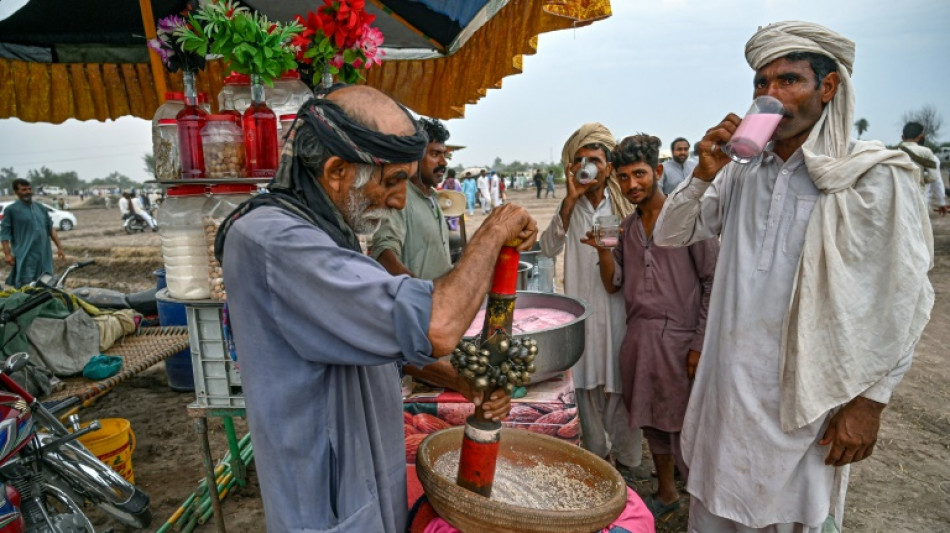
-
 Patriots-Seahawks Super Bowl approaches as politics swirl
Patriots-Seahawks Super Bowl approaches as politics swirl
-
Trump says China's Xi to visit US 'toward the end of the year'

-
 Real Madrid edge Valencia to stay on Barca's tail, Atletico slump
Real Madrid edge Valencia to stay on Barca's tail, Atletico slump
-
Malinin keeps USA golden in Olympic figure skating team event

-
 Lebanon building collapse toll rises to 9: civil defence
Lebanon building collapse toll rises to 9: civil defence
-
Real Madrid keep pressure on Barca with tight win at Valencia

-
 Dimarco helps Inter to eight-point lead in Serie A, Juve stumble
Dimarco helps Inter to eight-point lead in Serie A, Juve stumble
-
PSG trounce Marseille to move back top of Ligue 1

-
 Two prominent opposition figures released in Venezuela
Two prominent opposition figures released in Venezuela
-
Hong Kong to sentence media mogul Jimmy Lai in national security trial

-
 Lillard will try to match record with third NBA 3-Point title
Lillard will try to match record with third NBA 3-Point title
-
Vonn breaks leg as crashes out in brutal end to Olympic dream

-
 Malinin enters the fray as Japan lead USA in Olympics team skating
Malinin enters the fray as Japan lead USA in Olympics team skating
-
Thailand's Anutin readies for coalition talks after election win

-
 Fans arrive for Patriots-Seahawks Super Bowl as politics swirl
Fans arrive for Patriots-Seahawks Super Bowl as politics swirl
-
'Send Help' repeats as N.America box office champ

-
 Japan close gap on USA in Winter Olympics team skating event
Japan close gap on USA in Winter Olympics team skating event
-
Liverpool improvement not reflected in results, says Slot

-
 Japan PM Takaichi basks in election triumph
Japan PM Takaichi basks in election triumph
-
Machado's close ally released in Venezuela

-
 Dimarco helps Inter to eight-point lead in Serie A
Dimarco helps Inter to eight-point lead in Serie A
-
Man City 'needed' to beat Liverpool to keep title race alive: Silva

-
 Czech snowboarder Maderova lands shock Olympic parallel giant slalom win
Czech snowboarder Maderova lands shock Olympic parallel giant slalom win
-
Man City fight back to end Anfield hoodoo and reel in Arsenal

-
 Diaz treble helps Bayern crush Hoffenheim and go six clear
Diaz treble helps Bayern crush Hoffenheim and go six clear
-
US astronaut to take her 3-year-old's cuddly rabbit into space

-
 Israeli president to honour Bondi Beach attack victims on Australia visit
Israeli president to honour Bondi Beach attack victims on Australia visit
-
Apologetic Turkish center Sengun replaces Shai as NBA All-Star

-
 Romania, Argentina leaders invited to Trump 'Board of Peace' meeting
Romania, Argentina leaders invited to Trump 'Board of Peace' meeting
-
Kamindu heroics steer Sri Lanka past Ireland in T20 World Cup

-
 Age just a number for veteran Olympic snowboard champion Karl
Age just a number for veteran Olympic snowboard champion Karl
-
England's Feyi-Waboso out of Scotland Six Nations clash

-
 Thailand's pilot PM lands runaway election win
Thailand's pilot PM lands runaway election win
-
Sarr strikes as Palace end winless run at Brighton

-
 Olympic star Ledecka says athletes ignored in debate over future of snowboard event
Olympic star Ledecka says athletes ignored in debate over future of snowboard event
-
French police arrest six over crypto-linked magistrate kidnapping

-
 Auger-Aliassime retains Montpellier Open crown
Auger-Aliassime retains Montpellier Open crown
-
Lindsey Vonn, skiing's iron lady whose Olympic dream ended in tears

-
 Conservative Thai PM claims election victory
Conservative Thai PM claims election victory
-
Kamindu fireworks rescue Sri Lanka to 163-6 against Ireland

-
 UK PM's top aide quits in scandal over Mandelson links to Epstein
UK PM's top aide quits in scandal over Mandelson links to Epstein
-
Reed continues Gulf romp with victory in Qatar

-
 Conservative Thai PM heading for election victory: projections
Conservative Thai PM heading for election victory: projections
-
Vonn crashes out of Winter Olympics in brutal end to medal dream

-
 Heartache for Olympic downhill champion Johnson after Vonn's crash
Heartache for Olympic downhill champion Johnson after Vonn's crash
-
Takaichi on course for landslide win in Japan election

-
 Wales coach Tandy will avoid 'knee-jerk' reaction to crushing England loss
Wales coach Tandy will avoid 'knee-jerk' reaction to crushing England loss
-
Sanae Takaichi, Japan's triumphant first woman PM

-
 England avoid seismic shock by beating Nepal in last-ball thriller
England avoid seismic shock by beating Nepal in last-ball thriller
-
Karl defends Olympic men's parallel giant slalom crown


Pakistan's Sufi festivals reclaim spirit after violence
Rhythmic drums and spirited dancing are once again bringing life to the shrines of Pakistan's saints, where festivals were long stifled by jihadist violence.
As the harvest season ends and schools finish for the summer, villagers climb atop tractor trolleys, buses and rickshaws to head to the annual celebrations at Sufi shrines dotted across the country.
"Those who cannot meet during the rest of the year reunite at the fair," said Muhammad Nawaz, a farmer from Punjab province at the annual "mela" to honour saint Shah Jiwana in Jhang city in May.
"These fairs and Punjab's culture share a profound connection, one of love and brotherhood."
Fairgrounds, musicians, traditional wrestlers and motorcycle acrobats delight pilgrims lit by lanterns of all colours -- but always under the watchful eye of hundreds of police officers.
Centuries-old Sufi orders across the Islamic world have millions of followers, from Turkey to South Asia, and their beliefs are rooted in mysticism and a devotion to saints.
Many orthodox hardliners consider Sufi beliefs heretical, however, and Sunni militant groups such as the Pakistani Taliban and Islamic State have carried out bloody attacks at shrines and festivals.
In Pakistan, the attacks led authorities to ban festivals or limit their activities until recently.
"The goal was to avoid risking public lives," said Alloudin Mehmood, a government official at Bari Imam shrine in Islamabad, targeted by a 2005 suicide bombing that killed 19 people.
Security has dramatically improved after several military operations, allowing celebrations to slowly return.
"Only after receiving security clearance was the festival permitted last year, ending a 16-year hiatus," Mehmood added.
The event was shortened from five days to three, with mobile phone signals suspended for security reasons.
- 'Culture is resilient' -
The landscape of rural Pakistan is adorned with thousands of Sufi shrines, varying in size from grand edifices to modest structures, each steeped in a tapestry of associated legends.
"There are cities which emerged around these shrines and melas"said Pakistani author and anthropologist Haroon Khalid.
Particularly in Punjab and Sindh, saints, commonly referred to as "Pirs," are revered and miracles attributed to their spiritual presence.
"These shrines have endured threats and persecution," said anthropologist and author Zulfiqar Ali Kalhoro.
"Culture always has a remarkable resilience, capable of absorbing shocks and persevering through challenging times."
The annual celebrations commemorate the anniversaries of a saint's death and symbolise the spiritual union between devotees and the divine.
"Pilgrims find solace, healing, release and entertainment at these events that celebrate the 'friends of God'," said Carl W. Ernst, who has authored several books on Sufism.
Sufism has inspired some of Pakistan's most beloved artists, writers and musicians.
Sufi shrines often attract marginalised groups, including transgender women and drug addicts.
"We are never as well-received as at festivals," Khusbhoo, a transgender woman, told AFP.
- Come to the fair -
At the Shah Jiwana shrine, devotion gives way to entertainment in the late afternoon.
A juice seller belts out a famous Punjabi song: "Forget about your responsibilities for a while; let's head to the fair instead."
Thousands turn to the fields to witness traditional games such as Kabaddi, a rough contact sport where opponents slap each other around the face, and tent pegging, a more graceful display of horsemanship.
Against the neon background of the fairgrounds, 16-year-old stunt girl Fatima Noor prepares her motorbike.
Defying both gravity and social taboos, she circles the "wall of death" to the amazement of the crowd -- a chance to earn some money for her family.
"These fairs must be held, because we do not have any other employment opportunities," she said.
Eighteen-year-old Hamid Ijaz delighted in the celebrations, disrupted for much of his childhood.
"Because of how widespread hate and sectarianism are in our country, it's crucial to organise events like these where people can come together and foster love," he told AFP.
F.Qawasmeh--SF-PST




